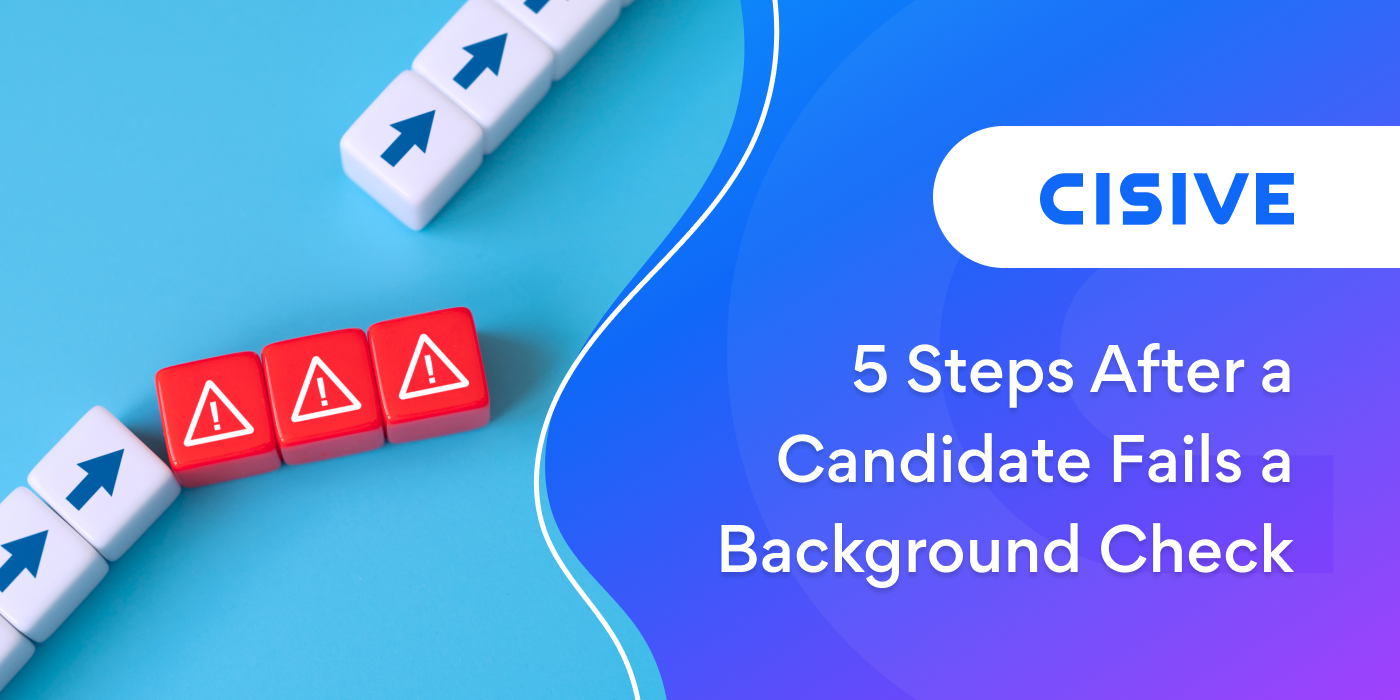

Data about job applicants suggests they’re growing dissatisfied with the hiring process. Many...

What happens when a candidate fails a background check after you’ve already extended the job offer?
Your first reaction may be to automatically rescind the job offer. However, this step could put you out of compliance with government regulations and set your organization up for a potential lawsuit.
If you’re going to conduct applicant background checks, it’s important to develop a strategy that creates a fair, unbiased process that meets all federal and state requirements.
For example, you’re required to give applicants an opportunity to explain any issues found through the background screening process. This step lets you make an informed decision before automatically disqualifying the candidate.
One of the best ways to ensure your company remains in compliance and receives the most accurate background screening results possible is to work with a third-party vendor. Professional background check service companies, such as Cisive, provide the fast, accurate results your organization needs to make the best hiring decisions.
A failed background check cannot automatically disqualify the candidate for employment without giving them the chance to respond.
What should you do if an applicant has a failed background check after a job offer? While a failed background check can adversely impact time-to-hire, there are some important steps you need to take to create a fair, effective, and compliant recruitment process.
This guide provides tips on what to do when an applicant fails a background check.
Key Takeaways
|
A comprehensive background check screens various factors impacting employment, such as verifying education and employment histories, conducting criminal background checks, and administering drug testing.
Typically, employers create a customized background-checking process that screens specific factors that are pertinent to the company and position. This screening is often conducted after a conditional job offer is made but before the onboarding process begins.
Technically, background check service companies don’t rank screenings as pass or fail. Instead, they provide a final report that details any inaccuracies or issues they uncover during the screening process.
As an employer, it’s important to have policies in place that dictate what issues trigger a failed background check. Keep in mind that a failed background check doesn’t necessarily disqualify the candidate for employment, but it does require a closer examination and some extra steps.
Recommended Reading: The 4 C’s of Onboarding

A failed background check after a job offer doesn’t automatically disqualify candidates from job offers. Instead, there are several steps you should take to closely examine the results of a background check and give the applicant a chance to respond.
Before conducting background checks, it’s important to create a specific policy pertaining to these screenings. This policy should identify what factors you want to screen, how the screening will be done (in house or through a professional background check service company), and what constitutes a failed background check.
The policy must be compliant with all federal and state regulations. When working with a professional background screening company, make sure they understand and comply with all required regulations.
Once you have a policy in place, you can refer to it whenever issues with background checks arise. This structure can ensure a consistent, fair, and unbiased screening process.
If issues with a background check cause your organization to consider revoking the job offer, it must first notify the applicant. The Fair Credit Reporting Act, or FCRA, requires employers to send the candidate in question a pre-adverse action notice.
This notice must include an explanation of the information you found, along with a copy of the background check. Additionally, you must include a copy of “A Summary of Your Rights Under the Fair Credit Reporting Act.”
Once you send the pre-adverse action notice to the applicant, you must give them time to respond. Some states have a set timeframe for the waiting period that ranges from 5 to 10 days.
If your jurisdiction has no set waiting period, it’s recommended to give the candidate at least 5 to 10 days to respond to your notice. This step gives candidates a chance to clarify any inconsistencies, provide more documentation, or explain any negative factors on their background screening report.
Once the candidate responds to your notice, it’s time to reevaluate the job offer. Carefully determine if the issues with the background check could negatively impact job performance, damage the company culture, or put the company at risk.
In some instances, this may be a simple decision. For example, an applicant with a suspended license can’t work in the trucking industry until their right to drive is fully restored.
Other cases may not be so clear-cut. You may need to conduct an individual assessment that takes all factors, including the applicant’s response, into account before making a final decision.
If your organization decides to rescind the job offer, you must send the applicant a final adverse action notice. This notice must include:
Be sure to keep a copy of these notices along with any supporting documents or information.
Recommended Reading: The Real Cost of a Bad Hire

There are a number of factors that could result in a failed background check.
Any type of criminal record on a candidate’s background check is likely to cause a red flag. This includes convictions, pending cases, and even arrests that result in dismissals, acquittals, or dropped charges.
Naturally, a conviction may be more serious than an arrest that didn’t result in a conviction. Additionally, a felony charge is more serious than a misdemeanor.
It’s important for employers to evaluate the specific duties and responsibilities of the role in question when determining if a criminal record disqualifies an applicant for employment.
For example, a poor driving record may disqualify an applicant in the trucking industry, but not if they're applying for a job in retail. On the other hand, a criminal record for fraud or theft could cause an employer in the finance industry to revoke a job offer.
An applicant’s work history is a vital component of their overall resume. The right experience can demonstrate that the candidate has a high level of skills and know-how.
However, if the candidate is lying or embellishing their work experience, it could cause you to hire a candidate who lacks the skills and qualifications your company needs. Unfortunately, studies show that 70% of applicants lie on their resume, so the risk of this happening is great.
Comprehensive background checks may reveal inconsistencies between the applicant’s job resume and their real experience. This could include everything from inaccurate information pertaining to their job title or job duties to incorrect details related to their dates of employment or reason for termination.
These types of issues in a background check report may cause some concerns for employers. Depending on the level of inaccuracies or how pertinent it is to the position, it could be enough to retract the job offer.
The level and type of education a candidate has is another crucial factor when comparing applicants. In fact, some roles require a certain level of education.
You don’t want to onboard a new hire who claims to have a certain degree only to find out they never finished or even started the program.
If a background check shows the candidate lied about their level of education, you may have no choice but to suspend the job offer. Even if you do have a choice, you may determine that a candidate who would lie or embellish something so important isn’t a good fit for your company.
If part of the new hire’s role requires them to drive company-owned vehicles, screening their driver record is critical. Hiring a candidate with a poor driving record can put your company at risk of higher insurance rates or potential liability issues.
For instance, you won’t be able to insure a driver with a suspended license, or you may face higher insurance premiums if the new hire has multiple infractions on their driving records, such as DUIs or traffic accidents.
Through the background checking process, you can obtain a copy of the candidate’s driving record. If these records uncover any current or past issues, such as a suspended license, multiple traffic violations, numerous accident reports, or criminal charges, you may need to rethink the job offer.
Drug screening has become a common component of the recruitment process. This testing process allows employers to determine if the candidate may have a substance abuse issue that could impact on-the-job performance.
Drug testing for employment can screen for various types of illicit drugs, including amphetamines, cocaine, marijuana, opiates, methadone, and many more.
Many states have laws and regulations pertaining to drug testing as part of the recruitment process. For example, some states require employers to notify applicants that drug testing could be part of the hiring process, while other states only allow drug screening after a conditional job offer is made.
It’s important to understand various drug testing regulations in your state and to remain compliant with these laws. It’s equally important to have a drug screening policy in place that dictates how to handle failed drug tests.
Recommended Reading: Build an Applicant-Centric Background Check Program
While rescinding a job offer may be necessary, don’t make this decision in haste. There are several things you should consider before making any final decisions, such as:
Background checks can improve hiring outcomes and protect the company from costly bad hires. However, it’s important to have a clear background-checking policy in place to ensure a fair, unbiased, and compliant process.
Cisive offers comprehensive background check services to help you identify potential issues before finalizing the job offer. Our detailed reports provide the information you need to make sound hiring decisions that are best for your business.
We offer a 99.9994% accuracy rate on our background-checking services, so you can feel secure knowing you're making the best hiring decisions.
Speak to one of our Cisive experts today to book a consultation or try a demo of our background-checking tools.
Author: Jenni Gallaway
Bio: Content Marketing Manager at Cisive. 8 years of experience in the background screening industry.
Let's Connect on LinkedIn
Data about job applicants suggests they’re growing dissatisfied with the hiring process. Many...

Hiring an unqualified or underqualified person can cost your company a lot of money and damage its...

As an HR pro or a hiring manager, the last thing you want to do is make a bad hire. Hiring mistakes...